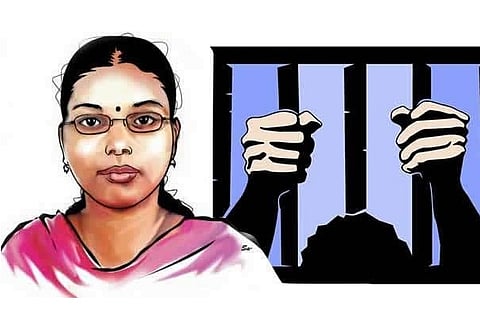

The day that the police said they had arrested a man suspected to be Jisha’s killer, there was a strange atmosphere in Vattolipadi village in Perumbavoor. As it tends to happen in such cases, there were an overwhelming number of men around Jisha’s house eagerly looking for information from journalists, mostly to vindicate their own apparent prejudices. The women and children in contrast, behaved like frightened rabbits scampering away at the sight of journalists approaching them.
As they stood in small groups some distance away from Jisha’s house, the men talked a lot about “bad character”, mostly directed at Jisha’s mother Rajeshwari and her sister Deepa.
Dressed in a lungi and shirt, one man declared: “Outside this village everyone sympathises with Rajeswari. But we know what she was. But Jisha was good, a silent girl.”
Among the villagers, there appears to be near total consensus that Jisha’s mother and sister were villains and that Jisha had paid the price for it.
But any compassion for even Jisha ended at this small allowance.
Located on the bank of a small stream, Jisha’s house was at some distance from the lavish houses in neighbourhood, but not completely isolated.
According to the police, Jisha is likely to have died at around 6 pm but the neighbourhood only woke up to the tragedy when Rajeshwari reached home at around 8.30 pm and found the door locked.
Just one neighbour appears to have witnessed something on April 28. No one else appears to have heard anything that evening. When she saw journalists, she ran inside her house and locked the door. However, she later spoke to The News Minute.
“I saw someone running but did not see it clearly. I am not sure whether I heard a voice from there,” she said with great reluctance.
Asked whether she checked, she replied in the negative. “Nobody goes to their house. Her mother was a weird lady,” said the woman, declining to speak further. Her testimony to the police is probably the most important. She said she had seen a man in a yellow shirt running away.
Asked whether no one else helped her, another neighbour Sreedharan echoed the woman and went further. “Many people come there (to the house). They were ostracized because of her mother’s bad character. Everyone here has known that for years. We men are scared to even stand on the road near her house, because people may think we visit them.”
Another neighbour too sought to blame the neighbourhood’s apathy towards the family on Rajeshwari.
Vishnu, a 25-year-old auto driver, described Jisha as a bold woman. “She was bold enough to defend the questions about her mother’s ‘immorality’. Many might have tried to see her in that context, but everyone says she was a good, bold, girl.”
Savithri, a government employee, says she learned the caste identity of the family only after Jisha’s murder. “They were not hated because of their caste. Many other Dalits also live nearby. Just see whether they are neglected in the society. If the whole neighbourhood disliked them (Rajeshwari and her daughters) they probably had their reasons,” Savithri said in a raised voice, inadvertently admitting that the village harboured hostility towards Jisha’s family.
Her attitude raises the question of what we do as individuals, when confronted with the possibility that our neighbours – however much we feel justified in disliking them – might be in trouble.
There was a lone voice of compassion among the villagers. Ironically, it was a man. Rajesh claimed Rajeshwari had filed cases against many of the village boys, sometimes, “for no reason other than standing in front of her house”.
Like the rest of the village, he was aware that Rajeshwari was a single woman who raised her daughters in a ramshackle house struggling to make ends meet.
“Maybe she filed cases because of her insecurities (financial and social). People’s fake morality too haunted Jisha’s family. In a way we all are responsible for what happened to them,” he added.